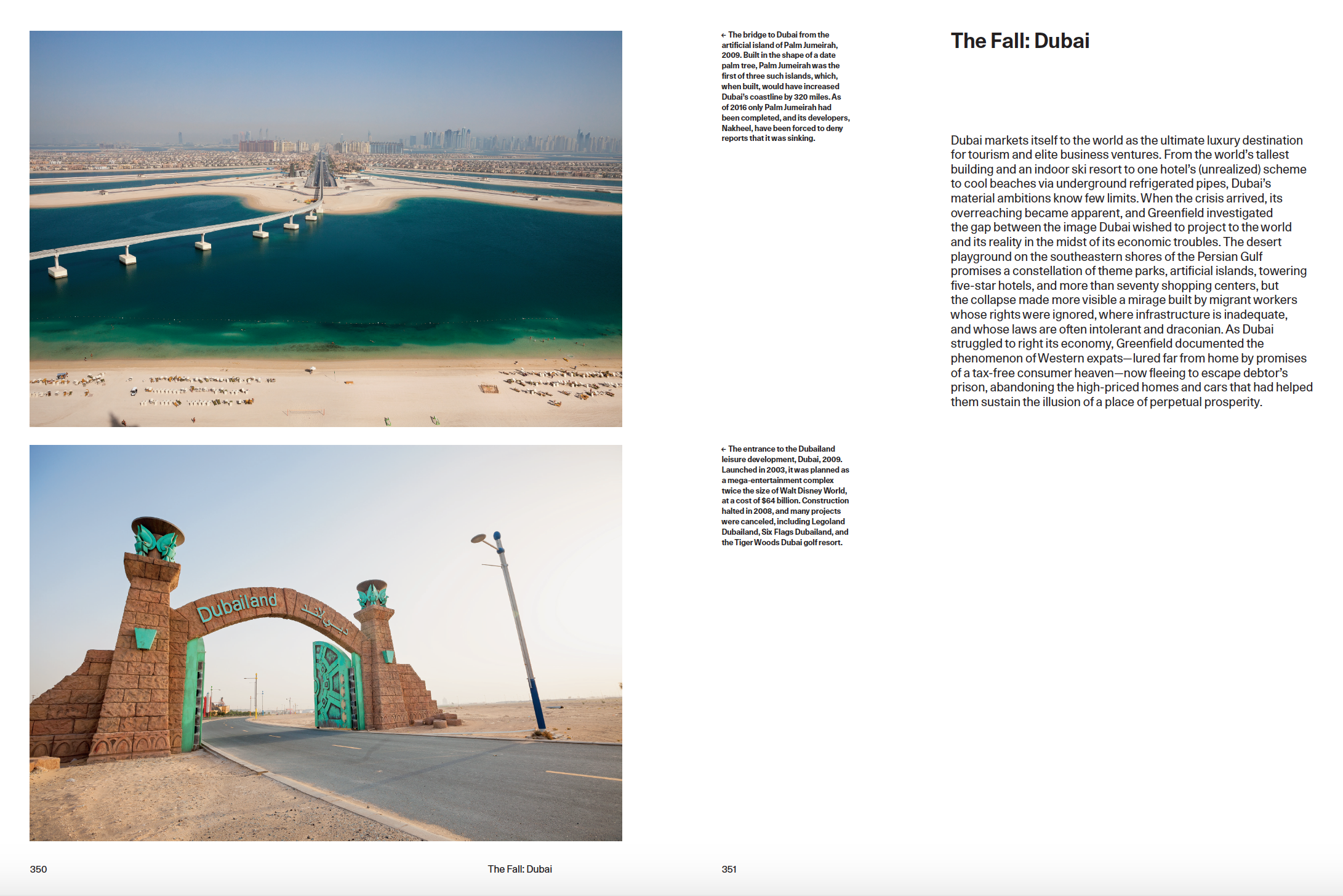“Oh please, Americans do not hate the rich; they want to be them. Every American believes that they are the impending rich, and that will never change.”
“Generation Wealth is being published as Donald Trump becomes president of the United States. Perhaps more than any other public figure, Trump represents the culture that Greenfield has chronicled...Trump, and Trumpism, becomes far more understandable after a trip through Greenfield’s America.”

Phaidon
Hardback
English
Lauren Greenfield, with a foreword by Juliet Schor
305 x 229 mm, 12 x 9 in
504 pp
625 colour illustrations
ISBN-13: 9780714872124
ISBN-10: 0714872121
INTRODUCTION BY LAUREN GREENFIELD - Generation Wealth is the fruition of a twenty-five-year documentary inquiry into what I have called “the influence of affluence.” Consciously at times—and at other times unconsciously—I have captured signs of a seismic shift in our culture. I began to recognize the pattern in 2008, during the financial crisis, and I have been trying to decipher it ever since, both by making new work for this project and by editing the photographs I’ve made throughout my career.
The title of the project and many of the pictures could mislead the reader to think that this is a work about the 1 percent, about people who are wealthy. It is not. This work is about the aspiration for wealth and how that has become a driving force—and at the same time an increasingly unrealistic goal—for individuals from all classes of society. We have less social mobility now than we had in prior generations, and, more than ever before, a greater concentration of wealth is in the hands of the few. Flouting this reality, the “American Dream” has grown to outsized proportions. “People don’t dream in modest terms anymore. They all want to live in Mar-a-Lago with Donald Trump,” says social critic Chris Hedges, whom I interviewed for this book and companion film. As our political system becomes less democratic—with wealthy donors and well-funded special-interest lobby groups exercising disproportionate influence on elections and legislation—we have experienced a democratization of the signifiers of wealth. Luxury for the common man, woman, and child defines the new American Dream. And if you don’t have money, as Emanuel, one of my teenage subjects in Los Angeles, assures us, “There are ways to make it seem like you do.” The aptly named rapper Future explains that the strategy is to “fake it till you make it.” This sentiment is echoed by many of my subjects who seek material-based status, from Minnesota to Milan, South Central Los Angeles to Shanghai, Dubai to Moscow. As Hedges attests, fictitious representations of a luxury lifestyle have replaced actual social mobility. The fact that many of the images in this book appear to be of worlds of wealth and belie their reality is precisely the point for both the subjects and for the image-maker (me) in an image-based culture.
As a photographer and filmmaker, and in a variety of media, from analog to digital, I have been asking questions about the culture of materialism, the cult of celebrity, and presentation-based status since my first major project, Fast Forward: Growing Up in the Shadow of Hollywood, which I began in 1992 and published as my first book in 1997. That work explored those themes in the context of youth culture in Los Angeles and was inspired by my own high-school experience. At the time, I was struck by the early loss of innocence in our media-saturated culture, taking stock of a generation impacted by what I called “the values of Hollywood.” In that early work, I documented the excesses of the affluent, the attraction of what we now term “bling” among the poor, and the desire for fame and status-based image across boundaries of class, race, and neighborhood. What started to emerge in front of my camera was the dramatic influence of commercial pressures on young people’s values and behavior, as well as an unexpected homogenization of youth culture resulting from the shared consumption of increasingly ubiquitous media messages. I remember saying on the radio, while discussing my Fast Forward book, that despite the dramatic divisions in the city revealed by the L.A. riots, which I had covered in 1992, rich kids and poor kids had found common ground that their parents had not, and it was a shared love for Versace. ..Click to read the entire introduction essay by Lauren Greenfield
click this link to view the complete set of images in the archive (same order as in the monograph)
Visit the Generation Wealth website here
Front and back cover of Phaidon monograph below, plus sample pages...buy it here



















